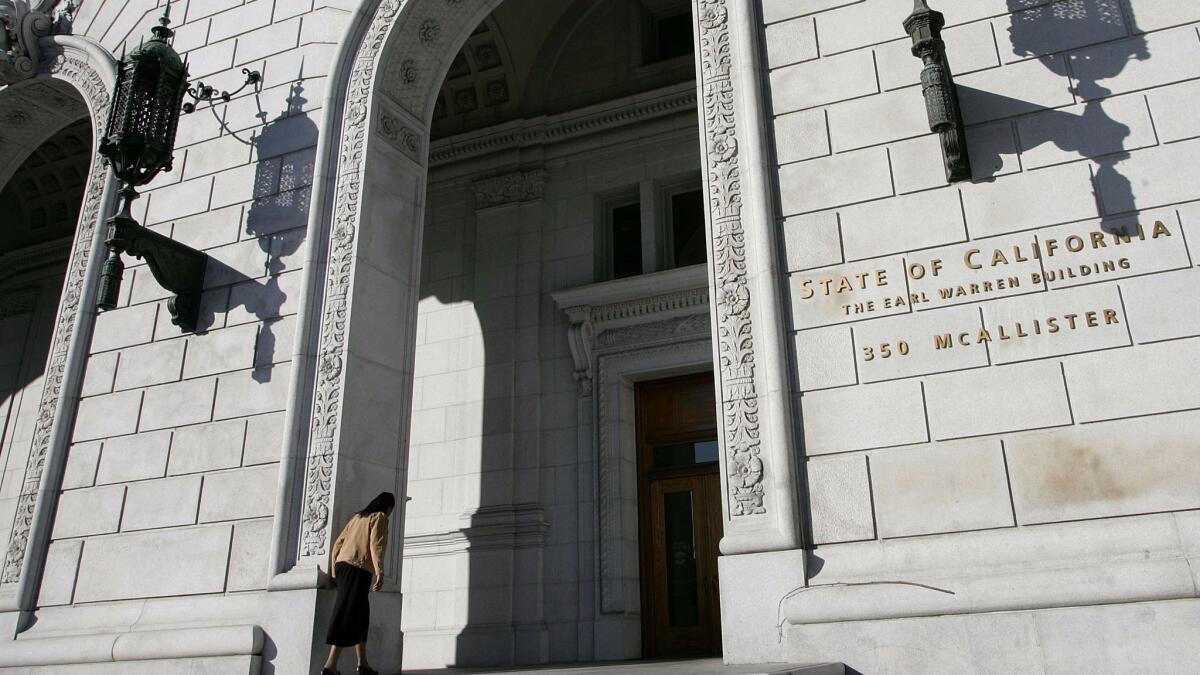Don’t drive child-porn viewers away from therapy

- Share via
In their zeal to prevent crime and protect would-be victims, well-meaning lawmakers and courts sometimes make matters worse with gratuitous punishments and onerous enforcement mandates. That’s especially true with sex crimes, and most especially with such crimes that victimize children.
One case in point is a law adopted by California lawmakers in 2014 that requires therapists to report patients who admit to having viewed or downloaded child pornography. Not just patients who say they do it all the time, or who say they intend to do it, but those who admit, in therapy, that they have done it in the past.
The state Supreme Court is considering whether the mandate is constitutional. The question for Californians, though, it not whether the law is constitutional, but whether it’s wise.
It’s not.
The instinct to shield minors from sexual exploitation is righteous and fundamental. Experience tells us that some adults will prey on children to satisfy their own desires, and that children cannot always depend on their parents or other responsible parties for protection. Societies rightly invoke the law to safeguard children and to punish adults who commit what may be the ultimate transgression. Laws prohibiting direct exploitation of children, as in sex trafficking, are easy to defend. Laws against creating, reproducing, distributing and even possessing child porn are likewise appropriate. Such acts victimize the innocent first in their creation and then again each time a depiction is viewed.
The state’s authority to adopt and enforce such laws is beyond reasonable question, as it should be.
At issue is when the state should be able to compel psychotherapists to turn in their patients who admit that they have viewed child porn.
The law properly holds therapists to account for not acting to prevent crimes that they believe are soon to occur. A therapist who knows the patient is about to commit a murder or a rape owes far more to the potential victim than to the patient. The same principle applies to viewing child porn, even if the prospective harm is not as direct. It is still harm, and it is egregious.
Although the law properly protects the confidentiality of the therapist-client relationship, the protection has limits, as it should. The value of affording a patient the opportunity to seek treatment is often outweighed by the duty — society’s and the therapist’s — to protect the innocent.
But the equation shifts when the patient merely reports having viewed porn in the past, rather than an intention to do so in the next moment or next day. The gain to the child victim and to society of mandating a report in such a case is outweighed by benefit of confidentiality.
Some child-porn viewers may be dealing with psychiatric disorders and may seek professional help. Society, and the law, should encourage that help, for two separate reasons: We should value patient confidentiality all on its own, as long as it’s not outweighed by a greater value like preventing a crime; and we should be wary of inadvertently permitting worse harm.
Like what? Like shutting off an avenue of treatment for a person who wants to change and needs help to do it. Real help would be difficult without the ability to confide in a licensed professional. And of course few would ever unburden themselves if they knew their statements would be reported to the police. With nowhere to turn for help for past misdeeds, perpetrators who want to change would have less chance to succeed. That advances the interests of no one — not the patient, not the child victims, not society.
It’s like requiring drug treatment counselors to turn in all their clients for drug possession. Who would ever seek treatment?
For many crimes, California has finally wised up about the no-tolerance, prosecution-first approach that has long been standard operating procedure. There’s something about sex crimes and child victimization, though, that make lawmakers lose their bearings and their ability to weigh harms. The state Supreme Court will decide whether the overly broad 2014 reporting mandate is constitutional. But in any event, it’s a bad idea.
More to Read
A cure for the common opinion
Get thought-provoking perspectives with our weekly newsletter.
You may occasionally receive promotional content from the Los Angeles Times.






